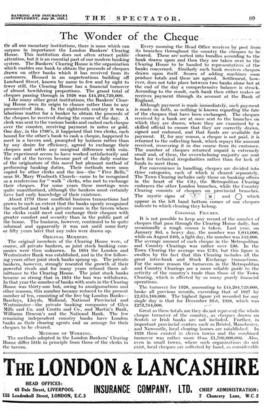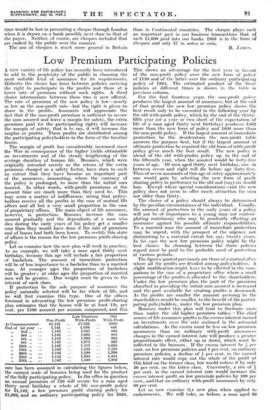COLOSSAL FIGURES.
It is not possible to keep any record of the number of cheques that pass through the Clearing House daily, but occasionally a rough census is taken. Last year, on January 3rd, a heavy day, the number was 1,044,000, while on August 24th, a light day, the number was 542,000. The average amount of each cheque in the Metropolitan and Country Clearings was rather over £30. In the Town Clearing the average was £E33, but this figure is swollen by the fact that this Clearing includes all the great inter-bank and Stock Exchange transactions. For the same reason the turnovers in the Metropolitan and Country Clearings are a more reliable guide to the activity of the country's trade than those of the Town Clearing, .which is affected by so many purely financial operations..
The turnover for 1928, amounting to £44,204,729,000, broke all previous records, exceeding that of 1927 by £2,654,188,000. The' highest figure yet recorded for any single day is that for December- 31st, 1928, which was £273,764,000.
Great as these totals are they do.uot represent.the whole; cheque turnover of the country,, as cheques drawn on Scotch or Irish banks are not included. Further, in important provincial centres such as-Bristol, Manchester, and Newcastle, local clearing houses are established. Iri 1928 these existed in eleven towns and the combined turnover was rather more than £1,700,000,000. Also, even in small towns, where such organizations do not exist, local cheques are collected by hand, as considerable time would be lost in presenting a cheque through London when it is drawn on a bank possibly next door to that of the payee. Neither, of course, are cheques included that are cashed by the public over the counter; ' The use of cheques is much more general in Britain than in Continental countries. The cheque plays such an important part in our 'business transactions that of each £1,000 paid into our banks £993 is in the form of cheques' and only £7 in notes, or coin.
R. JAMES.

















































 Previous page
Previous page